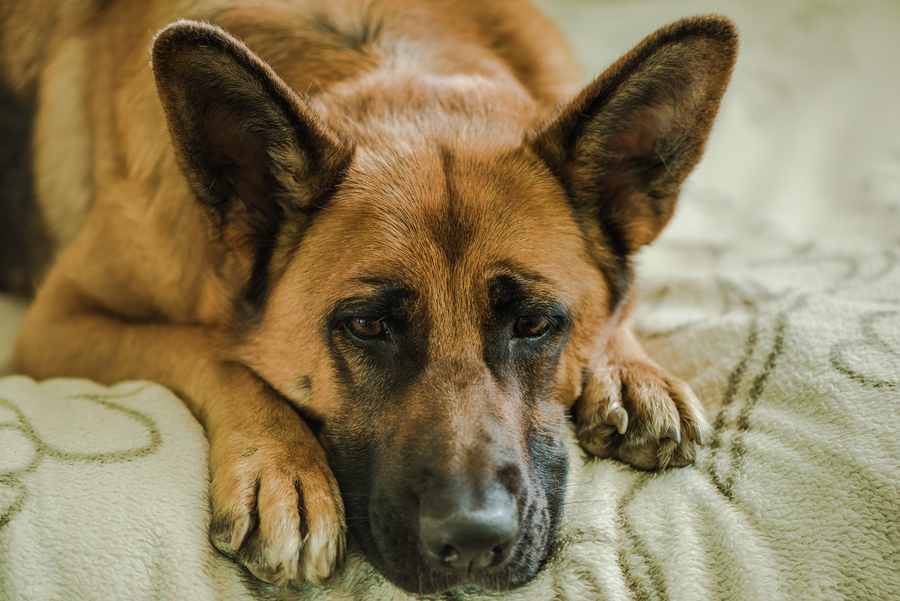
This post may contain affiliate links. We are compensated for referring customers to our affiliate partners.
Bloat in dogs is a much more serious problem than one might immediately expect. If “bloating” doesn’t incite fear in the hearts of dog owners, try Gastric Dilatation-Volvulus (GDV), the scientific term for complications of a bloated stomach. That one is a little scarier. Research shows, in fact, that bloating is the second leading killer of dogs, with only cancer taking more lives. It’s important to prevent bloating in dogs as this is an issue that faces many different breeds. GDV is much more common in deep-chested dogs, like German Shepherds and Great Danes, but should be considered a risk for every breed, as the condition can be caused by a number of things and poses a substantial and immediate threat that requires treatment right away.
Dr. Karen Becker Discusses Bloat In Dogs
What is GDV?
Bloating is when a dog’s stomach fills with gas, food, or fluid. When this occurs, the stomach expands and puts pressure on other organs, including vital organs. It can prevent necessary blood flow and heart beating, it can tear the wall of the stomach, and can prevent normal breathing. If the dog’s stomach rotates or twists, it becomes GDV. That twisting could trap blood in a dog’s stomach, preventing it from circulating elsewhere, which would send a dog into shock. The key to prevent bloating in dogs is to stop these things from occurring in the first place.
What are the symptoms of bloating or GDV?
The first step to prevent bloating in dogs is to understand the symptoms. Restlessness, drooling, a visibly swollen stomach, visible anxiety, pacing, and dry heaving might all indicate bloating in a dog. As the situation gets worse, those symptoms could evolve into collapsing, pale gums, a rapid heartbeat, shortness of breath, and general weakness. If you suspect at all that your dog might be experiencing bloating or GDV, take them to a veterinary clinic immediately. It is not worth the risk of your dog losing its life.
Dr. Jones Talks About How To Recognize & Prevent Bloating In Dogs
What causes GDV and Bloat in Dogs?
Unfortunately, there’s no consensus on all of the causes of bloating, and since excesses of gas, food, and liquid can all be responsible, there’s certainly no uniform cause. This makes it a bit challenging to prevent bloating in dogs, especially those who are more suspectible to having it occur. While genetic and environmental factors may come into play, there are identifiable factors that cause bloating or put dogs at risk. Something as simple as eating out of a raised food bowl or eating quickly, could begin the process. Additionally eating or drinking too much, often caused by eating one large meal a day, could be the source of the problem. Physically overexerting after eating a large amount is also a cause, so lots of activity right after eating is not recommended.
How is Bloat in Dogs and GDV Treated?
A veterinarian will have to quickly run tests to diagnose how bad the condition is. The pressure in the dog’s stomach will have to be released, which can either be achieved with a tube down the throat, or in the worst cases, a needle through the stomach. If the dog’s stomach is twisted, an emergency surgery will be necessary.
How You Can Prevent Bloating in Dogs
Splitting up meals, and making sure your dog doesn’t eat too much are huge preventative measures. Additionally, dogs should never be eating out of a raised food bowl, unless a vet has ordered it. Limiting activity after eating as much as possible will also reduce the risk.
In regards to foods that might cause bloat, foods that contain a lot of grains are highly suspect. Grain-free options are much preferred. Some researchers would go as far as to say avoiding kibble in general is a good safety precaution. There is evidence that suggests that adding water to dry food can be particularly dangerous.
Foods that are very high in fat, meaning foods that have a kind of fat as one of the first four ingredients, should be avoided at all costs. It is also likely that dog foods that contain citric acid as a preservative might be a cause of bloating and GDV.
While all of the above information may be concerning to read, there is no cause for fear, if the necessary preventative measures are taken. Luckily there are tons of dog food brands that are completely grain free and should not inherently pose any risks. If you feed your dog naturally healthy food in small-enough-to-digest portions, then the risk of GDV drops tremendously.
How To Prvent Bloat In Dogs
Dog Food to Help Prevent Bloating in Dogs
There are many foods that are optimal for preventing bloat in dogs, but we’ve picked out a few of our favorites that are grain-free, lower in fat, and do not contain artificial preservatives so you can rest easy.
Nature’s Variety Instinct Raw Medallions
Nature’s Variety Instinct Raw Medallions are an excellent frozen dog food that come in an unbelievably vast number of meat options. Chicken, Beef, Lamb, Duck, Rabbit, and Venison, are all tasty options for your dog. Nature’s Variety Instinct Raw Medallions are quite aptly named, mimicking the ancestral canine diet that was primarily composed of raw meat. Since they are in the shape of medallions, they provide easier portion control for dogs, to ensure that they don’t overeat. These medallions are 95% meat (as labeled), organs, and bone, and the remaining 5% is composed of vegetables, fruits, and other wholesome ingredients– all amounting to a balanced, protein-rich, and vitamin-rich meal. Nature’s Variety Instinct Raw Medallions are safely frozen, so they are fresh and satisfying, without dangerous preservatives, by the time they arrive in your dog’s bowl.
Newman’s Own Organics Grain Free Food for Dogs
Newman’s Own Organic Dog Food is a brand of organic dog food that rivals the quality of the food they make for people. These canned options, which are available in Chicken and Liver, Beef and Liver, and Turkey are guaranteed grain-free, leaving more room in the can for organic protein instead of filler. Fiber, both soluble and insoluble, is included as well in the form of organic pea flour and organic alfalfa. Newman’s Own Organic Grain Free Dog Food also contains tons of the vitamins, minerals, and compounds that are essential to canine health, and has no artificial flavors or preservatives.
These foods can make a huge difference in your dog’s digestive health and to help prevent bloating in dogs. So if your dog is diagnosed with GDV, consider feeding them one of these easy to digest foods.
